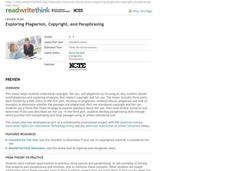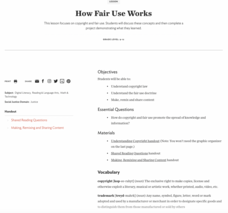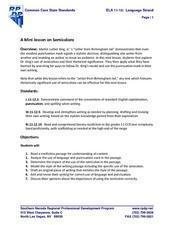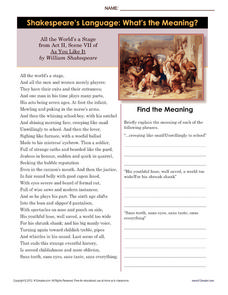iKeepSafe
The First Amendment, Copyright, and Fair Use
Do I have a right to make a copy? Head off this commonly asked question with this colorful, informative infographic, and promote digital citizenship in your class by directing learners to ask the right questions before downloading...
ReadWriteThink
Exploring Plagiarism, Copyright, and Paraphrasing
Plagiarism, copyright, and fair use are the focus of a three-part instructional activity designed to inform scholars of how to properly cite others' work. First, pupils use a KWL chart to begin thinking and discussing plagiarism. They...
Teaching Tolerance
How Fair Use Works
What's fair is fair! Using the resource, scholars discuss the key differences between fair use and copyright. Next, in small groups, pupils create and present projects that demonstrate fair use of copyrighted material, such as a song,...
Eau Claire Area School District
Intellectual Property Lesson Plans
Fair use, intellectual property, public domain ... what does it all mean? Scholars act as judges to determine if different scenarios constitute fair use. They also advance their research skills by practicing paraphrasing and citing...
Smarter Balanced
Intellectual Property
To prepare for a study of intellectual property rights, (or an assessment) introduce your learners to the legal concepts and key vocabulary associated with the debate. After defining intellectual property, copyright, fair use, and...
Music Publishers Association of the United States
I Made It. I Own It. Please Don't Steal It.
Explore the world of copyright law with a variety of activities to instill the importance of respecting creative property. Scholars watch an animated tale then take part in a grand conversation detailing the video's main idea, details,...
Deliberating in a Democracy
Globalization and Fair Trade
Have you ever traded something? How do you know you got a good deal? Scholars use case studies and research to determine the role of globalization in fair trade. Class members examine consumer demand and competition bring to light the...
EngageNY
Setting Purpose for Research: What are Fair Working Conditions?
Life may not be fair but working conditions should be. Scholars research working conditions at Wegmans by studying the company website. They complete a working conditions anchor chart and discuss their findings in a think-pair-share...
Smithsonian Institution
What's the Code? Coding Robot Movements Using Sound
Tap into the desire to learn about computer codes. Pupils apply the Tap Code and the Polybius Square to send secret codes using sound. They design a code that tells a robot what movements to make and then test out their code using one of...
National Nanotechnology Infrastructure Network
Is Measuring an Art or a Science?
Not only do future engineers learn the difference between accuracy and precision, they also get some hands-on experience using different measuring tools.
Smithsonian Institution
Weather Widget
What's so difficult about predicting the weather? Scholars work collaboratively to build a device that models how meteorologists use computers to forecast weather. Team members collect and interpret data while working together to...
Northwest Career & Technical Academy Foundation
What's Mine Isn't (Necessarily) Yours
When we use images or ideas from the Internet, we might be infringing on someone's rights. Give your class the opportunity to understand copyright and creator's rights as they evaluate fair and legal use of media found online. As they...
Curated OER
Plagiarism Workshop
What do George Harrison, Vanilla Ice, and Steven Ambrose all have in common? The Warner Brothers’ films Batman Forever and The Devil’s Advocate? All are guilty of plagiarism. And if you are considering a research project and want to...
Teach Engineering
Nanotechnology and Cancer Treatments
Information on the biomedical use of nanotechnology, specifically in the detection and treatment of cancer, is the focus of a lesson that seems like it is out of a science fiction novel. Pupils learn about electrophoresis, which is used...
K12 Reader
Robert Burns’ Poetry: A Red, Red Rose
Regional dialect can make a lovely poem even more beautiful. After translating the Scots words in "A Red, Red Rose" into modern English, class members identify the two similes Robert Burns uses in his poem.
Federal Reserve Bank
Would Increasing the Minimum Wage Reduce Poverty?
Here is a fantastic and relevant question to discuss with your class members. Using detailed reading material and a related instructional activity, your learners will learn about labor markets, equilibrium wages, price floors, and...
Southern Nevada Regional Professional Development Program
A Mini lesson on Semicolons
Dr. Martin Luther King, Jr.'s "Letter from Birmingham Jail" serves as an exemplar for a mini-lesson on semicolons. Working alone or in small groups, class members first circle all the semicolons in the letter, and then consider how this...
World Intellectual Property Organization
Learn from the Past, Create the Future: Inventions and Patents
3D printers, selfie sticks, smart watches. GPS, self-driving cars, YouTube. Imagine life without inventions. Believe it or not, these items were all invented in the last 10 years. Inventions, and the inventors responsible for them, are...
K12 Reader
The Road Not Taken
"The Road Not Taken," is the focus of an exercise that asks readers to identify the figurative meaning of Robert Frost's poem.
K12 Reader
Shakespeare's Language: What's the Meaning?
You needn't be an actor to stage this exercise in reading comprehension. Kids examine Jacques's "All the World's a Stage" speech from Act II, scene ii, of As You Like It, and explain the literal meaning of the figurative language. There...
Federal Reserve Bank
GDP: Does It Measure Up?
Here is resource that offers a very clear explanation for how economists measure economic growth by comparing real GDP over time. There is also an additional worksheet that details the expenditure method and four components for...
Federal Reserve Bank
Why Scarce Resources Are Sometimes Unemployed
Why do markets operate inefficiently when the world's resources are so limited? Review the various types of unemployment that exist and why some resources, especially human resources, go unused.
Smithsonian Institution
Trait Tracker
Help mice beat the odds with an exciting activity about traits. Biologists discover the role of diet and other factors on animal traits by participating in a simulation activity. Teams collect and evaluate data to understand how certain...
























